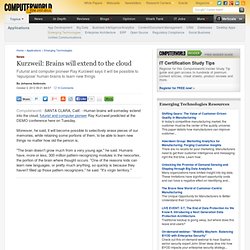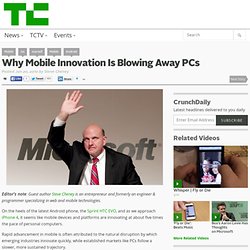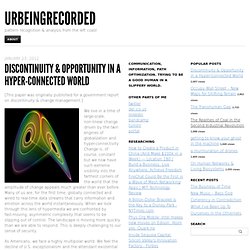

Digital Fabrication. CNC & 3D Printing. "Getting Smarter About the Smart Grid" - An Energy and Electricity Policy White Paper (November 2012)
Leonar3do: Inside 3D Printing 2013 NYC. DIY. Jeremy Rifkin: The Third Industrial Revolution. 3D Printing. Anything that can be reduced to a flowchart will be automated « 21st Century Prosperity. Linear thinking vs Exponential thinking - Peter Diamandis. Sensors Are About To Disrupt Your Industry. Wireless sensors are starting to unleash a wave of disruptive innovation that will bring with it immense entrepreneurial opportunities. There will be more wireless sensors in our world--by far--than there are smartphones, dumb phones, tablets, laptops and PCs combined. Billions upon billions today--and trillions tomorrow. Disruption. Welcome to YouTube! The location filter shows you popular videos from the selected country or region on lists like Most Viewed and in search results.To change your location filter, please use the links in the footer at the bottom of the page. Click "OK" to accept this setting, or click "Cancel" to set your location filter to "Worldwide".
The location filter shows you popular videos from the selected country or region on lists like Most Viewed and in search results. To change your country filter, please use the links in the footer at the bottom of the page. 1 20:20 TEDxMuscat - Mathias J. 2 18:30 Paddy Ashdown: The global power shift by TEDtalksDirector 48,040 views 3 10:35 Public Libraries, 3D Printing, FabLabs and Hackerspaces by mybluheaven 23,827 views 4 16:15 Peter Diamandis: Abundance is our future by TEDtalksDirector 149,334 views 5 1:00:57 Peter Joseph Radio Lecture "A Profile of Collapse" [ The Zeitgeist Movem... by TZMOfficialChannel 8,030 views 9 5:58 Keen On...
Don Tapscott. Kurzweil: Brains will extend to the cloud. News By Johanna Ambrosio October 3, 2012 09:21 AM ET Computerworld - SANTA CLARA, Calif. - Human brains will someday extend into the cloud, futurist and computer pioneer Ray Kurzweil predicted at the DEMO conference here on Tuesday.

Moreover, he said, it will become possible to selectively erase pieces of our memories, while retaining some portions of them, to be able to learn new things no matter how old the person is. "The brain doesn't grow much from a very young age," he said. Coordination economy. Why Mobile Innovation Is Blowing Away PCs. Editor’s note: Guest author Steve Cheney is an entrepreneur and formerly an engineer & programmer specializing in web and mobile technologies.

On the heels of the latest Android phone, the Sprint HTC EVO, and as we approach iPhone 4, it seems like mobile devices and platforms are innovating at about five times the pace of personal computers. Rapid advancement in mobile is often attributed to the natural disruption by which emerging industries innovate quickly, while established markets like PCs follow a slower, more sustained trajectory. But there are deeper fundamentals driving the breathtaking pace of smartphone advancement.
Component vendors supplying to smartphone OEMs have evolved a much different DNA than those supplying to PC makers. Hardware / Chipset Integration Differences in Smartphones vs PCs: Intel’s monopoly in PC processors and peripheral chipsets has caused PC innovation to stagnate. Blog Archive » Discontinuity & Opportunity in a Hyper-Connected World. [This paper was originally published for a government report on discontinuity & change management.]

We live in a time of large-scale, non-linear change driven by the twin engines of globalization and hyper-connectivity. Change is, of course, constant but we now have such extreme visibility into the farthest corners of the world that the amplitude of change appears much greater than ever before. Many of us are, for the first time, globally connected and wired to real-time data streams that carry information and emotion across the world instantaneously. When we look through this lens of hypermedia we are confronted by fast-moving, asymmetric complexity that seems to be slipping out of control. The landscape is moving more quickly than we are able to respond. As Americans, we face a highly multipolar world.
In the United States there is arguably a crisis of confidence in governance. So if there is a crisis of confidence, is there an actual crisis in governance? Disruptive technologies: Advances that will transform life, business, and the global economy. The relentless parade of new technologies is unfolding on many fronts.

Almost every advance is billed as a breakthrough, and the list of “next big things” grows ever longer. Not every emerging technology will alter the business or social landscape—but some truly do have the potential to disrupt the status quo, alter the way people live and work, and rearrange value pools. It is therefore critical that business and policy leaders understand which technologies will matter to them and prepare accordingly. Disruptive technologies: Advances that will transform life, business, and the global economy, a report from the McKinsey Global Institute, cuts through the noise and identifies 12 technologies that could drive truly massive economic transformations and disruptions in the coming years.
The report also looks at exactly how these technologies could change our world, as well as their benefits and challenges, and offers guidelines to help leaders from businesses and other institutions respond. Robots.